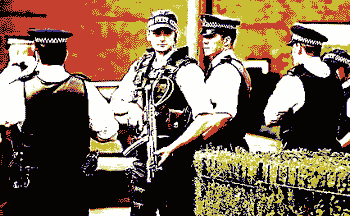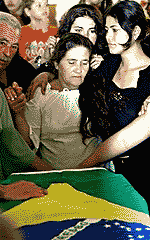|
from 07 august 2005
blue vol IV, #18 |
|
|
Jean Charles de Menezes 
by Liz Davies and Alex Morris
25 July 2005 By Liz Davies
On Friday, the police acted as judge, jury and executioner. Jean Charles de Menezes is a victim of the war on terror in London, just as those who died on 7 July are victims. He was killed for three simple reasons: he wasn't white, he was wearing a bulky coat and he ran away from the police. Who knows why he ran, but for no reason that could justify summary execution. The rush by leading London and national politicians, and by most sections of the media, to support the police action was breath taking. In a democratic society, the first response when a member of the public is killed by the police should be to suspend the officers involved and to announce an independent inquiry. There are circumstances, obviously, when an inquiry might conclude that the only thing that the police could have done, to protect the public or themselves, was to kill. But the gravity of that conclusion is such that it should only be reached after independent scrutiny of all the circumstances, not as a knee-jerk reaction on the day. Instead, politician after politician queued up to explain that shoot-to-kill is now necessary. Now that we know that Menezes had nothing to do with terrorism, and there is to be an inquiry, Sir Ian Blair expresses his regret at the tragedy but adds, almost casually, that it might happen again. The inquiry must examine not only the actions of the police at the scene, but the instructions from the top and the whole "shoot-to-kill" policy. It must never happen again. Where have we seen the state operate "shoot-to-kill" before? Apartheid South Africa, present-day Palestine, Los Angeles, and, of course, Northern Ireland. New Labour's assault on civil liberties, ratcheted up several notches post-9/11, reproduces the infamous policing techniques used in Northern Ireland. Extraordinarily, New Labour chooses those methods from Northern Ireland which were not only abuses of civil liberties but were also profoundly ineffective. Internment in 1970s Northern Ireland, described as the IRA's best recruiting tool, has been followed by 21st-century detention in Belmarsh. Muslim communities are treated by the police and racists as suspect communities, with thousands of young non-white men subject to stop and search, and racist attacks escalating, just as the Irish community was in the 1970s and 1980s. Now we see the police operating shoot-to-kill and doing so under pressure, after 21 July, to get results. The pressure to get results produced the Guildford Four, Birmingham Six, Annie Maguire and her family, and Judith Ward - all appalling miscarriages of justice, but at least not executions. This war on terror has become a by-word for failures of intelligence. A failure of intelligence led to Jean Charles de Menezes' death. A failure of intelligence, and our politicians doctoring the intelligence that was available, led to the announcement that Iraq had weapons of mass destruction, to an illegal invasion and continuing illegal occupation, and to the deaths of thousands of innocents - civilians and soldiers. Those failures of intelligence have created the climate for terrorism to escalate. We must end the view that civil liberties are negotiable. America and Britain have encouraged, and practised, torture, despite the absolute prohibition on torture in international law that both countries have signed up to. Both countries will use evidence extracted by torture elsewhere. Both have practised torture on detainees in Iraq, in Bagram, and in Guantanamo Bay, alternatively denied and justified as preventing further acts of terorrism. But, of course, what someone says under torture is not reliable, it's aimed at what the victim believes the torturer wants to hear. Mass murders have not been prevented. Torture didn't identify the bombers in Madrid, Istanbul, London, Egypt. Now summary execution is acceptable if, apparently, it is used to forestall mass murder. But, just like torture, the chances of summary execution actually preventing mass murder are remote. The chances, however, of the police getting it wrong and killing innocent people are high. A democratic state has a duty to maintain non-negotiable standards; otherwise we slip further and further into arbitrary state power. Friday's shooting will make it harder for the police to find and prosecute those involved in 7 and 21 July, or anyone planning similar criminal acts. Just as the Irish community was suspicious of the police, so anyone who might be mistaken for a Muslim (logically any of us given that it is a religion, but in practice those who are not white) will think twice before giving information to the police. Suppose they detain me as a terrorist suspect? Suppose they shoot me if they raid my next-door neighbour's house? After 7 July, Charles Clarke announced further anti-terrorism offences. With the exception of the thought-crime proposal to criminalise anyone "glorifying" acts of terrorism, these offences are as yet unspecified and will be put before Parliament in the autumn, along with the government's earlier proposals to introduce ID cards. It's hard to imagine that Labour MPs will now have the guts to vote down ID cards; but the arguments remain the same post-7 July. ID cards wouldn't have prevented the tragedies of 7 July. As for the creation of further anti-terrorist offences, there are plenty of criminal offences available - murder, conspiracy to commit murder, the carrying of explosives. The police don't lack offences with which to charge potential suicide bombers; their problem lies in detecting them. The reality of more anti-terrorism offences is that the police will have more tools, and more opportunity, to harass anyone they choose and grievances will escalate. Above all, political solutions are required to end the war on terror. Blair's denial that the London bombs had any connection with the occupation of Iraq is as unrealistic, and self-justifying, as an alcoholic denying that he has a problem. Ending the occupation of Iraq and achieving justice for the Palestinians are necessary to bring about a better world, and would have the useful by-product of eliminating some of the sense of grievance that causes a very few to resort to violence. Until those happen, we will all remain less safe - from terrorism and from the state.
The Right to Arm Bears
It has since been reported that he was not linked to the bombings of two-and-a-half weeks ago, nor the attempted bombings of last Thursday. It appears that Menezes had an expired visa, which may explain why he ran away from the police. There have been - of course - strident denouncements of the Metropolitan Police's shoot-to-kill policy, claims that the police behaved like amateurs and like thugs, suggestions that the police should have known that the dead man was innocent of any wrongdoing (lapsed visa notwithstanding) and more. This is all very well but, only the day before, there were some failed attempts to detonate more bombs. Two weeks previously there were some successful bomb detonations, leading to the deaths of more than fifty people. There is an obvious risk that there may be more attempts such as these, and it is with this risk in mind that armed police have been deployed. The point to ponder, however, is not what was going through the victim's mind, but what was going through the police officer's mind at the time. It is unfortunate that an innocent life was lost, but how could the police have been expected to know that Menezes ran because he was in the country illegally? He had aroused their suspicions and ran away when challenged into the Underground, the scene of the aforementioned bombing attempts. No policeman (I would hope) wakes up each morning wondering who he's going to kill that day. Menezes' death was not planned beforehand. What was going through the police officer's mind on Friday? He has a sworn duty to protect London's citizens. He was presented with a situation which, on the face of it, appeared to be a threat to the safety of those very citizens he is sworn to protect. With very little time to analyse the situation he and his colleagues had to make a decision and act upon it. It turns out that the decision they made led to the death of an innocent man. Did the police overreact to the situation? Without knowing all the facts it is difficult to determine whether the police's response was unjustified; an inquiry will no doubt be held and the facts will emerge there. Be that as it may, given the reported situation and the reason why armed police were deployed, it is difficult to determine that the police acted incorrectly. If the police officers felt that Menezes posed a clear and present danger to the lives of the surrounding people then it is understandable why they responded in the manner they did. It has been reported that Menezes had fallen and was immobilised by the police before being killed. This suggests that the killing was more in the nature of an execution, but without all the facts it is difficult to determine this. For example, was Menezes bucking and trying to throw the officers off? Did the officers believe there was a risk of Menezes detonating a bomb should he manage to get a hand free? Should we have armed police? I dislike the idea of police officers being routinely armed; I believe one of the hallmarks of Great Britain, and indeed of any civilised nation, is that we do not issue guns to our regular police forces. It is a shame that we have any armed police officers but it seems that they are a necessary evil, given the intentions of certain elements of society both at home and abroad. If we permit armed police to operate then a direct corollary is that we must trust those same police to have the judgement to determine when it is necessary to use those weapons. They are rigorously trained in the use of firearms both for accuracy and for determining the necessity of firing their guns. But, however good the training is, an inevitable consequence of having armed police is that innocent people will be killed. The police are not perfect; they are not psychic. The police are only human, and fallible. All their training can do is make them less fallible than the civilians they protect, to minimise the number of innocent deaths. Last Friday the police made an error which cost an innocent man his life. Their judgement was mistaken. But what would have happened if they were presented with a man who was planning mass-murder but withheld their fire for fear of reprisals from an angry press and public? They would have been excoriated - and rightly so - for not preventing the subsequent atrocity. Last Friday one man died. Better one man than an entire Tube carriage-full. An inquiry will no doubt be held, and questions about the suitability of the officers' response and the level of their training will no doubt be asked. This is fine and proper. What is not fine and proper is the subsequent crying out for unnecessary - and mendacious - lawsuits, and calling for the police to drop their shoot-to-kill policy under the circumstances. Suing the police will not bring Menezes back to life. No amount of money paid to Menezes' family will restore their missing member. And, given the nature of the threat - human-borne bombs - the police have no option but to shoot-to-kill. Shoot-to-incapacitate still permits the bomber to trigger his payload. Even if the inquiry absolves the police officers involved of any wrongdoing, they still have to live knowing they killed an innocent man. That is punishment enough.

|
|||||
| BLUE is looking for short fiction, extracts of novels, poetry, lyrics, polemics, opinions, eyewitness accounts, reportage, features, information and arts in any form relating to eco cultural- social- spiritual issues, events and activites (creative and political). Send to Newsdesk. |

 London is a frightening place to live right now. We
Londoners are being shown a small glimpse of what it
must be like to live in Baghdad. We are in danger -
from terrorist bombs and trigger-happy police.
London is a frightening place to live right now. We
Londoners are being shown a small glimpse of what it
must be like to live in Baghdad. We are in danger -
from terrorist bombs and trigger-happy police.
 Last Friday a Brazilian man, Jean Charles de Menezes, was shot dead by
armed police officers in a London Underground station. At the time it
was reported that he had been seen at a house which was under
surveillance due to the previous day's attempted bombings, that he was
dressed unseasonably in a padded coat despite the warm weather, and
that he ran away from the police when challenged, allegedly vaulting a
closed ticket barrier in his attempt to escape.
Last Friday a Brazilian man, Jean Charles de Menezes, was shot dead by
armed police officers in a London Underground station. At the time it
was reported that he had been seen at a house which was under
surveillance due to the previous day's attempted bombings, that he was
dressed unseasonably in a padded coat despite the warm weather, and
that he ran away from the police when challenged, allegedly vaulting a
closed ticket barrier in his attempt to escape.